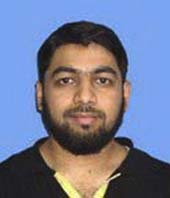 |
| Kafeel Ahmed |
London, Aug. 7: Arrangements are being made to hand over the body of Kafeel Ahmed to his family but this has not happened yet, the Crown Office in Edinburgh said today.
When the 27-year-old Indian engineer from Bangalore died on the evening of August 2 in Glasgow Royal Infirmary from 90 per cent burns sustained when he drove a Cherokee Jeep into a terminal building at Glasgow airport on June 30, Strathclyde police informed the Procator-Fiscal in Scotland.
The latter, a senior law officer, immediately ordered a post-mortem which had the additional task of formally confirming Kafeel’s identity. The Crown Office declined to say if the post-mortem had been completed but the assumption must be that it has.
It is not known which of Kafeel’s relatives, if any, will come to Glasgow, where the post-mortem has been conducted, to identify him and collect the body.
However, some reports have suggested that this very painful task will be performed by his mother, Dr Zakia Khan.
If she is coming, she may also want to meet her younger son, Sabeel, a 26-year-old Liverpool-based doctor who has been accused of not tipping off the police despite realising that his brother was planning a terrorist outrage.
After a longish delay, Sabeel has been allowed a consular visit from an official of the Indian high commission in London.
Asked if he needed any assistance, Sabeel replied that he would get in touch through his lawyers if he did.
As far as the repatriation of Kafeel’s body is concerned, the Crown Office has indicated that it will not make an announcement until the coffin is out of the country.
This is to ensure that Kafeel’s mother, if she comes, is not harassed by reporters and photographers.
Privately, in official circles, there is a great deal of sympathy for a mother who probably had little idea of her son’s involvement with militant Islam. The parents of most young British Muslim men convicted of terrorism were similarly kept in the dark.
There has been a pattern that those who took to terrorism showed little regard for the consequences of their action on those left behind at home, including aged parents.
If and when arrangements are finalised for the repatriation of Kafeel’s body to Bangalore, the Indian high commission will have to issue a certificate providing clearance “since he was an Indian national”. This, too, has not happened yet.
It has been reported that Kafeel left a suicide note.
The Herald newspaper in Glasgow, one of the most reputable in the country, has also provided some telling detail of Kafeel’s time in hospital.
The paper recalled: “The severity of his injuries led some medical experts to predict he would not survive. Some said he might not even live a week.”
The Herald quoted a comment made to another news organisation by an anonymous medical source who stated: “The prognosis is not good and he is not likely to survive. He has third-degree burns over most of his torso and limbs. It is beyond repair and because he has lost so much skin, he is now vulnerable to infection and won’t be able to fight it.”
The Herald lent credence to “senior police sources” who had claimed that Kafeel “was being kept alive on the orders of MI5. They claimed the security services wanted him alive to avoid a backlash from radical Muslims. It is understood he was on a life-support machine in hospital. Police and medical sources claimed the decision to keep him alive was more to do with politics than clinical judgement”.
According to a medical source, the combined cost of round-the-clock security and medical treatment for Kafeel had reached £150,000.
“He had been in a coma since the incident,” the Herald reported. “Most burns experts believed he was effectively dead. Last week it emerged that special shark-skin implants costing £20,000 were being used to treat his injuries.”
Later, there was a comment from the Scottish Executive, presumably in response to some public criticism that much money and effort were being spent by the National Health Service on keeping alive an alleged terrorist: “It was perfectly right that he should have received the appropriate treatment our health service could offer as this reflects the value our society places on human life.”
Judging from the evidence, Kafeel’s parents ought to be reassured that everything possible was done to save their son but the task was impossible from the start.










